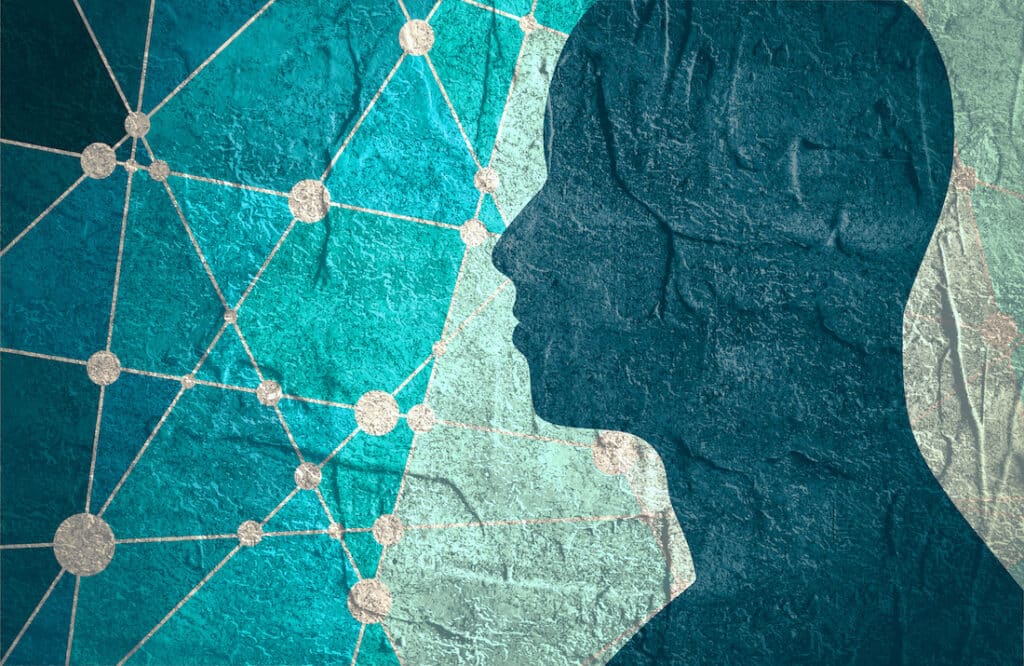Schizophrenia is a serious and often misunderstood mental health disorder. People with schizophrenia or schizoaffective disorder face incredible social stigma and a preponderance of false and harmful ideas about their capabilities and behaviors. These misconceptions can lead to shame, isolation, and avoidance of treatment among people with the condition.
Education and awareness are critical parts of destigmatizing schizophrenia and mental illness in general. It is especially important for the family members and loved ones of people living with schizophrenia to understand the mechanisms and symptoms of the disorder.
In this article, we’ll explore the clinical definition of schizophrenia, examine its symptoms, and outline some ways you can support a loved one diagnosed with the condition.
What is Schizophrenia?
Schizophrenia is a chronic mental health condition that affects a person’s thoughts, feelings, and behaviors and ultimately impacts their ability to interpret reality. Schizophrenia causes hallucinations, delusions, disordered thinking, and behavioral difficulties; it can affect daily functioning, sometimes so severely that a person requires hospitalization.
People with schizophrenia typically develop symptoms during late adolescence or early adulthood, but the condition can develop at any age. The severity of the disorder differs from person to person, with some experiencing episodic symptoms while others display more persistent and troubling delusions.
Schizophrenia is linked to a higher risk of suicide, addiction to alcohol and drugs, and a higher incidence of co-occurring mental health issues like anxiety and depression. Schizophrenia can also make it difficult for affected individuals to hold a job, maintain a home, attend school, or maintain normal social relationships.
What are the Symptoms of Schizophrenia?
There are three main categories of schizophrenia symptoms: positive, negative, and cognitive.
Positive Symptoms
When a person has schizophrenia, they experience extreme distortions in their thinking, perceptions, and experiences. These are called positive symptoms because they reflect the changes and disruptions in normal thinking and behavior that occur when schizophrenia is active.
Positive symptoms are often called psychotic symptoms because they can cause a person to lose touch with reality and develop skewed thought patterns and perceptions of the world.
Some examples of psychotic symptoms include:
- Hallucinations: Seeing, hearing, smelling, feeling, or tasting things that aren’t there. People with schizophrenia commonly experience auditory and visual hallucinations, often at the same time. These can include hearing voices or seeing people, animals, or figures. Tactile hallucinations (sensations of touching, crawling, or scratching on the skin) are also common.
- Delusions: Possessing strongly held beliefs that are not rooted in reality. Examples of delusions include hearing subliminal messaging in television shows or radio broadcasts, believing you have superpowers, believing you are being spied on or followed, or believing you are famous.
- Disordered thinking: Abnormal thought processes that cause scattered, distracted, or hard-to-follow speech or writing
- Disordered speech: Speaking incoherently (word salad, clang associations) or using made-up words
- Disordered movements: Exhibiting abnormal body movements, such as carrying out repetitive motions or sitting still for hours.
Negative Symptoms of Schizophrenia
In people with schizophrenia, negative symptoms describe the absence of normal behaviors and experiences. These include behaviors related to verbal communication and emotional expression, as well as social interaction, motivation, and interest. If schizophrenia is not yet diagnosed, these symptoms may be mistaken for depression or other mental illnesses.
Examples of negative symptoms of schizophrenia include:
- Diffculty expressing emotion in verbal communication; blunted affect
- Speaking less often, responding more slowly, and using fewer words
- Decreased interest in hobbies or activities that were once enjoyable
- Lack of motivation; avoidance of daily activities like grocery shopping, household chores, or maintaining personal hygiene
- Social isolation from friends, family, colleagues, or acquaintances
Cognitive Symptoms of Schizophrenia
Cognitive symptoms affect concentration, attention, and memory. These symptoms make it difficult to learn new things, remember commitments, or focus during conversations. A person’s level of cognitive functioning is usually an indicator of the severity of their condition.
Some examples of cognitive symptoms of schizophrenia include:
- Trouble paying attention or focusing
- Difficulty weighing options or making decisions
- Problems implementing new information
- Difficulty holding onto multiple pieces of information at once
What Causes Schizophrenia?
There is no single cause of schizophrenia. Current research indicates a combination of risk factors are most likely responsible for the development of schizophrenia.
These risk factors include:
- Genetics. Schizophrenia may run in families, but the presence of the condition in one family member does not necessarily mean another person will develop it. Some studies suggest that certain genes are associated with the development of schizophrenia, but researchers cannot yet single out a specific gene.
- Environment. Environmental components also affect whether a person develops schizophrenia. This includes things like living in poverty, exposure to viruses, or nutritional problems before birth.
- Brain structure and brain function. Studies suggest that people with schizophrenia are more likely to have differences in brain structure or connections between different areas of the brain than individuals without the disorder. Some of these structures are present before birth, but more research is needed to develop reliable conclusions.
How to Help Your Loved One
Watching a loved one live with untreated schizophrenia is a distressing experience. Many family members and friends are left feeling helpless and sometimes hopeless as they see their loved one struggle to function in daily life. This is especially true for individuals with severe cases of schizophrenia.
Learning more about the condition itself is the first step to supporting your loved one. The second step is learning more about schizophrenia treatments. Ensuring your loved one has access to proper treatment is imperative for their quality of life and their ability to function independently.
The most effective approaches to treating schizophrenia typically involve a combination of medication and psychotherapy. There is no one-size-fits-all treatment method, so medications and recommended therapies may differ from person to person.
Speaking with a clinician or treatment program that specializes in treating schizophrenia is a good first step to managing this disorder. Programs like the one at Lifeskills South Florida offer the comprehensive treatment programs needed to help individuals with schizophrenia live healthy, productive lives.
If you have a loved one suffering from schizophrenia, call us at 954-953-1742 or submit an online contact form to speak with an admissions specialist today.
References
- National Institute of Mental Health. (2023). Schizophrenia.
- NHS. (2023). Symptoms – Schizophrenia.




